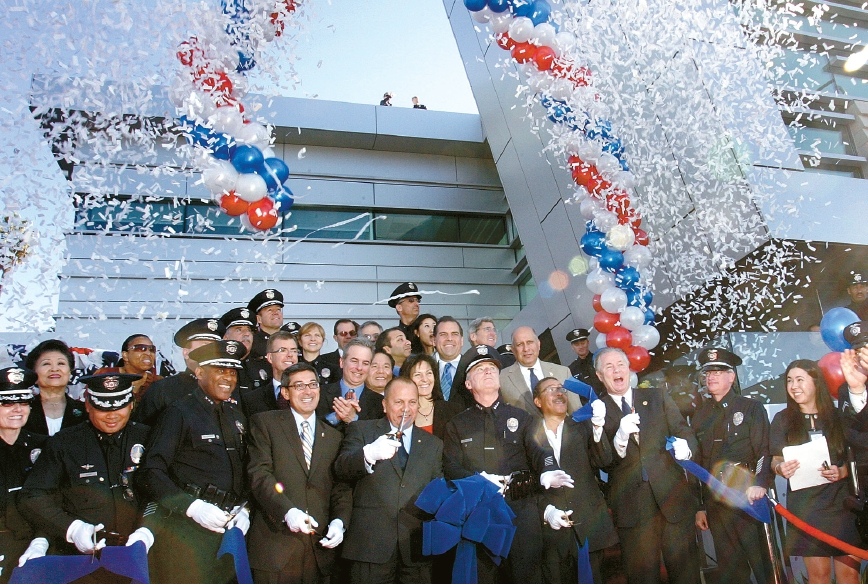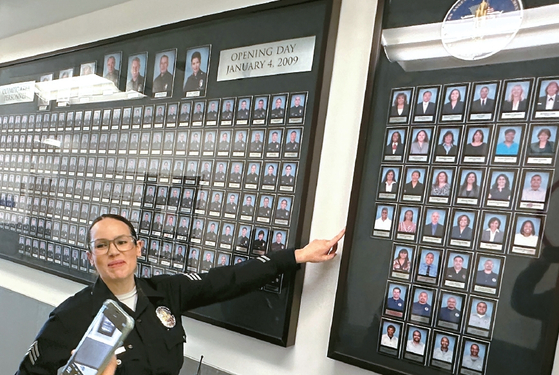[LAPD Olympic Community Police Station 15th Anniversary: 1]
The LAPD Olympic Community Police Station, which opened in 2009 with the support of Korean Americans, is celebrating its 15th anniversary this year. As the newest of the LAPD’s 21 stations, it has weathered the COVID-19 pandemic and city budget cuts that nearly resulted in its closure.
Currently, the station is dealing with staffing shortages that the LAPD is experiencing across the board. Despite fewer officers, the department’s commitment to protecting Koreatown remains steadfast. In March, the Korea Daily visited the station to learn more about its 15 years of change and the challenges it faces.


Prioritized Response
2:05 p.m. Inside the watch commander’s office on the first floor of the Olympic Community Police Station, eight large LCD monitors and computerized maps operate continuously. The monitors on the ceiling display real-time radio calls from patrolling officers. At this moment, one patrol car (20A16) is responding to five simultaneous calls, manned by only two officers.
“We’re headed to 2009 S Western Avenue,” Senior Lead Officer Harry Cho calmly informs a nervous reporter, pointing to one of the calls. “There’s a mentally ill woman on the street in danger, and we need to respond immediately,” he explained, breaking down the coded call.
“The Olympic Police Department receives more than 1,000 calls for service every month, averaging 30 to 40 calls per day,” said SLO Cho. “Residents ask, ‘Why are we late?’ but we must prioritize to manage all of them with limited resources.”
Absence of Special Problems Unit·SPU
On the second floor, the impact of the station’s understaffing is evident. The hallway, adorned with photos of many early officers and staff, echoes a robust past. The station now operates with about 245 personnel (235 officers and 10 civilian employees) from around 300 at its inception, marking an 18% reduction over 15 years, according to the station.
“When the station was larger, we had an enforcement unit called the Special Problems Unit (SPU), which has vanished due to personnel reductions,” SLO Cho noted. “Previously, when other stations were short-staffed, they would send officers to us. Now, given the LAPD’s overall staffing shortage, our response times are affected.”
System Overload
Entering the second floor, the first sight is the Detective desk, marked by a high partition and bustling investigators.
Six investigative teams operate here: Major Assault Crimes (MAC), Auto Theft, Burglary, Robbery, Juvenile, and Homicide (a joint operation with five stations under LAPD’s West Division).
The MAC team, the largest, includes 10 detectives, four of whom are Korean American. Daniel Ji, a Korean-American supervisor at the MAC who has been with the station since its opening, noted that battery is the most reported crime among Koreans.
“Often, disputes between family members and acquaintances escalate into physical confrontations,” he said. “Recently, we responded to a McDonald’s on Western Avenue where two Korean-American men in their 60s were fighting over a game of Go (Baduk). Such minor disputes frequently burden the 911 system,” he observed.
Investigative teams are also feeling the staffing strain. “We have fewer investigators now, with one detective managing 40 to 50 cases a month,” Ji added, “making timely case resolution challenging.”
A Police Station for the Community
“The station’s small jurisdiction fosters a brotherly atmosphere among officers,” said Watch Commander Peter Kim, a patrol Sergeant.
“Many Korean-American officers seek assignments at the Olympic station to serve their community,” he added, highlighting the station’s strong community ties.
Ascending to the second floor, the staircase words ‘SERVICE TO OUR COMMUNITIES’ stand prominently.
These words, according to Cho, serve as a daily reminder of the department’s core values, undiminished in spirit despite their physical fading over 15 years.
BY SUAH JANG, KYEONGJUN KIM, JUNHAN PARK [jang.suah@koreadaily.com]




